Historic Events That Happened During Queen Elizabeth II’s Reign
Throughout her historic 70-year reign, Queen Elizabeth II has been head of state through some of the most momentous events in modern world history from the assassination of U.S. President John F. Kennedy, to the lockdowns of the COVID-19 pandemic.
In the year that the queen celebrates her Platinum Jubilee, the first celebration of its kind in the thousand-year history of the British monarchy, Newsweek looks back at some of the most historic events that have happened during her reign.
1953 Coronation
Elizabeth II became queen on February 6, 1952, after the death of her father King George VI occurred while she was on a royal tour in Kenya. She immediately traveled back to Britain where she began her new duties as queen. However, she was not officially crowned for over a year.
Elizabeth’s coronation took place at Westminster Abbey on June 2, 1953, and was attended by the crowned heads of Europe as well as a special delegation from the U.S. headed by General George Marshall.
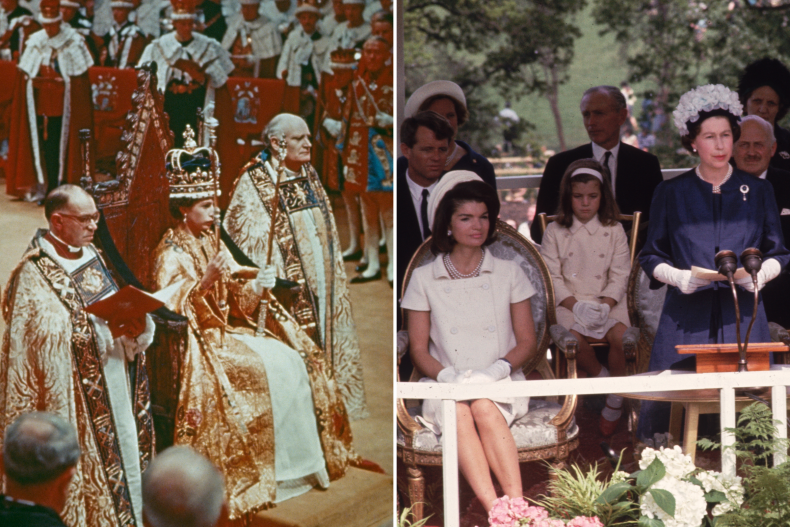
Hulton Archive/Getty Images/Keystone/Getty Images
1963 Assassination of President John F. Kennedy
The queen met President Kennedy and First Lady Jacqueline Kennedy at a reception hosted at Buckingham Palace in June 1961. The Kennedys were on their way back to the U.S. from their visit to Paris and so a semi-formal dinner was given in their honor by the queen. This meeting was dramatized in season 2 of The Crown.
When in 1963 President Kennedy was assassinated in Dallas, Texas the queen along with other world leaders sent her condolences to his widow. In May 1965, the queen invited Jacqueline Kennedy to Britain for the unveiling of the British national JFK memorial in Runnymede. During her speech she said:
“The unprecedented intensity of that wave of grief, mixed with something akin to despair, which swept over our people at the news of President Kennedy’s assassination, was a measure of the extent to which we recognized what he had already accomplished, and of the high hopes that rode with him in a future that was not to be.”
1966 Aberfan Disaster
One of the greatest national tragedies that the queen has witnessed in her reign occurred in the Welsh mining town of Aberfan in 1966. Heavy rain caused a landslide that engulfed a school building, killing 116 children and 28 adults.
At first, the queen reportedly refused calls for her to visit the disaster area immediately following the event because she feared that her presence would detract attention away from the rescue efforts which were still ongoing. It was eight days later that the queen finally visited Aberfan and the families of those killed.
In a 2002 book, author Gyles Brandreth recounted a conversation with the queen’s former private secretary Martin Charteris in which he said that the delay in visiting Aberfan was one of the major regrets that the queen has of her reign.
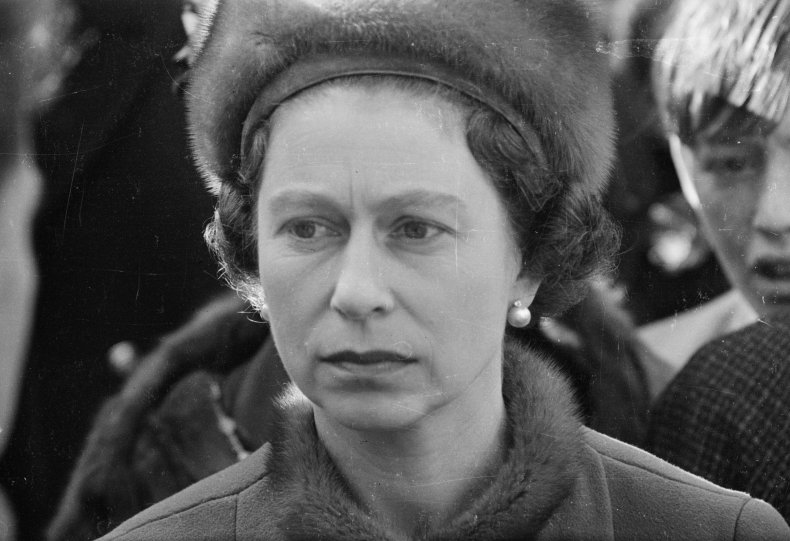
Ronald Dumont/Express/Getty Images
1969 Man Walks on the Moon
When Apollo 11 successfully landed a man on the moon for the first time in 1969, the queen sent a message reading: “On behalf of the British people, I salute the skill and courage which have brought man to the moon. May this endeavor increase the knowledge and wellbeing of mankind.”
1977 Silver Jubilee
The queen celebrated her first milestone jubilee in 1977 marking 25 years on the throne. Street parties, a river procession, thanksgiving services and a trip in the Gold State Coach all formed part of the festivities that were watched by millions around the world.
1981 Charles and Diana Wedding
The wedding of the queen’s son, Prince Charles, and Princess Diana was watched by a global audience of 750 million people. The ceremony took place at St. Paul’s Cathedral on July 29, 1981 and was followed by a balcony appearance at Buckingham Palace where the new princess appeared for the first time as a member of the royal family.
1989 Fall of Berlin Wall
On November 9, 1989, the Berlin Wall dividing East Germany and West Germany was dismantled by protesters following a five-day gathering opposing the oppressive division. The bringing down of the wall, completed in 1991, signified the fall of the iron curtain and the dissolution of the Soviet Union.
The queen first visited West Germany in 1965 in the spirit of reconciliation after World War II.
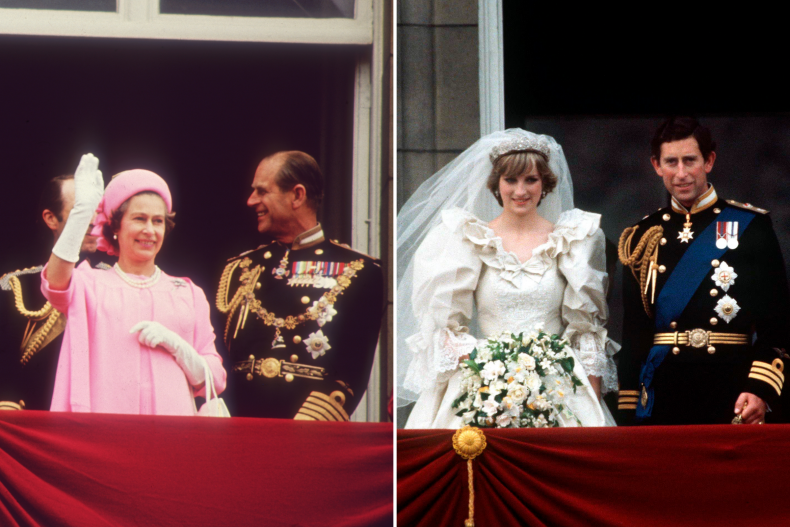
Fox Photos/Getty Images/ Tim Graham Photo Library via Getty Images
1992 Annus Horribilis
In a speech given at London’s Guild Hall in November 1992 marking her 40th year on the throne, the queen said: “Nineteen ninety-two is not a year on which I shall look back with undiluted pleasure. In the words of one of my more sympathetic correspondents, it has turned out to be an ‘Annus Horribilis.'”—Latin for “horrible year.”
This sentiment was prompted by a wave of criticism launched at the royals following the separation of Charles and Diana, Prince Andrew and Sarah Ferguson’s separation, and the divorce of the queen’s daughter, Princess Anne. These events were troubling for the queen and her sadness was compounded when a serious fire broke out at Windsor Castle destroying many of the semi-state apartments.
1994 First Visit to Russia
The queen was invited to make her first (and only) state visit to Russia in 1994 after the fall of the iron curtain. The visit was carefully constructed so as not to cause any offense on both ends with the queen’s Russian cousins, Czar Nicolas II and Czarina Alexandra Feodorovna, murdered by the Bolsheviks in 1918.
The visit followed a lunch hosted by the queen at Windsor Castle in 1989 for then-President Mikhail Gorbachev.
1997 Death of Diana
Princess Diana died in a tragic car crash in Paris’ Pont de Alma tunnel on August 31, 1997, after being chased by paparazzi and driven by a speeding, drunk driver. The princess’ death sent shockwaves around the world. At the time, the queen was staying at her Scottish retreat with Diana’s sons, Princes William and Harry, who were on their summer vacation.
The queen’s initial wish to keep her grieving grandsons away from the public eye was criticized. After five days, she made the journey to London to be with the people and make a special speech before the planned funeral:
“I admired and respected her for her energy and commitment to others, and especially for her devotion to her two boys. This week at Balmoral, we have all been trying to help William and Harry come to terms with the devastating loss that they and the rest of us have suffered. No one who knew Diana will ever forget her. Millions of others who never met her, but felt they knew her, will remember her.”
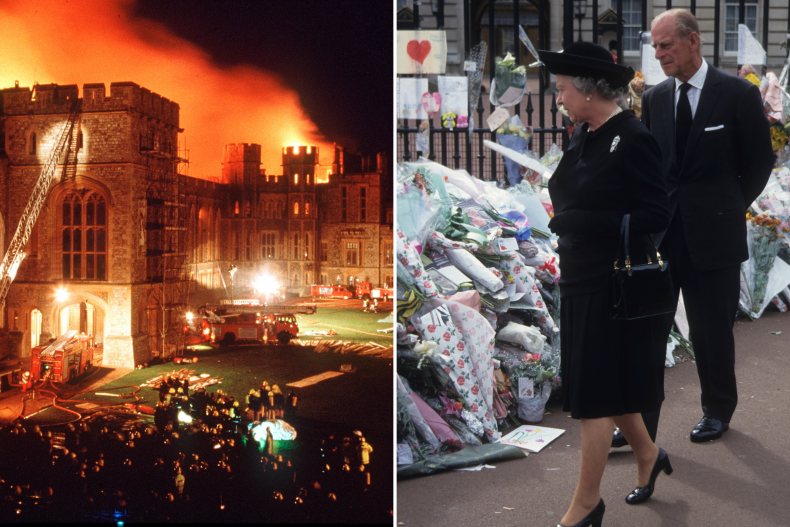
Tim Graham Photo Library via Getty Images/John Shelley Collection/Avalon/Getty Images
2001 September 11 Attacks
Following the September 11, 2001 attacks in the United States, the queen paid her own special tribute to the Americans living and working in Britain, as well as those who had been personally affected by the attacks.
For the first time in its history, the queen authorized the military band outside Buckingham Palace to play the American national anthem during the Changing of the Guard for the gathered crowds before she then attended a memorial to those killed and injured held at St Paul’s Cathedral.
2002 Golden Jubilee
For the queen, her Golden Jubilee, celebrating 50 years on the throne, followed a period of personal sadness. In February 2002, her only sister, Princess Margaret, died after a long illness. Just a month later their 101-year-old mother also passed away.
Despite these personal losses the queen undertook the full schedule of planned celebrations throughout the year including foreign tours and domestic visits, with central events planned in London including a pop concert and pageant.
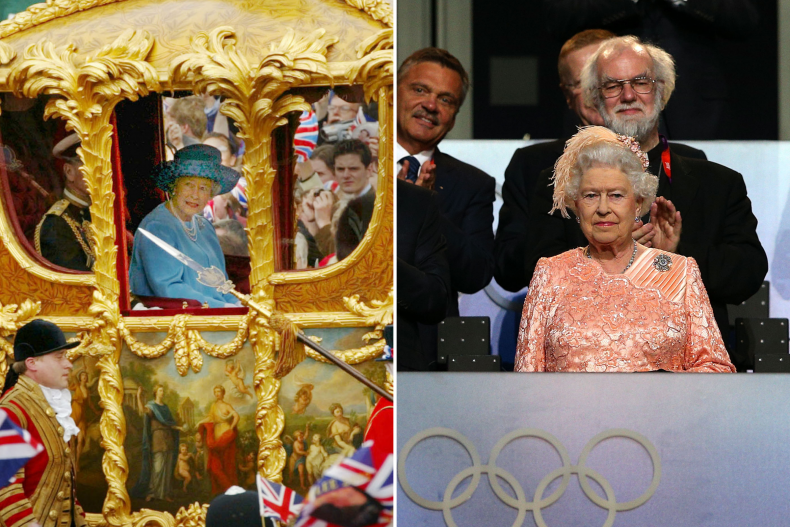
Sion Touhig/Getty Images/Cameron Spencer/Getty Images
2011 First Visit to the Republic of Ireland
The British crown’s long and painful history in Ireland had prevented any monarch from visiting until 2011 when it was agreed that the time had come for that to change.
The queen made a three-day visit to the country and paid many tributes to her hosts including wearing the national color, green, and opening her state dinner speech in Gaelic.
2012 London Olympics
The world’s attention was focused on Britain in 2012 with the queen’s Diamond Jubilee and the London Olympics all taking place throughout the summer. The queen’s appearance in a video played at the Games’ opening ceremony with co-star James Bond was warmly received. In declaring the events open, she followed her grandfather and father in the royal tradition.
2020 COVID-19 Pandemic
The COVID-19 pandemic escalation and lockdowns throughout Britain in 2020 saw the queen broadcast only the fifth message to the nation in her 70-year reign. Though the queen’s Christmas speech is an annual tradition, this kind of broadcast has only been undertaken in important circumstances such as the beginning of the first Gulf War or the death of Princess Diana.
During her speech, the queen made a unifying statement of reassurance ending with the words:
“We should take comfort that, while we may have more still to endure, better days will return: we will be with our friends again; we will be with our families again; we will meet again.”

Comments are closed.